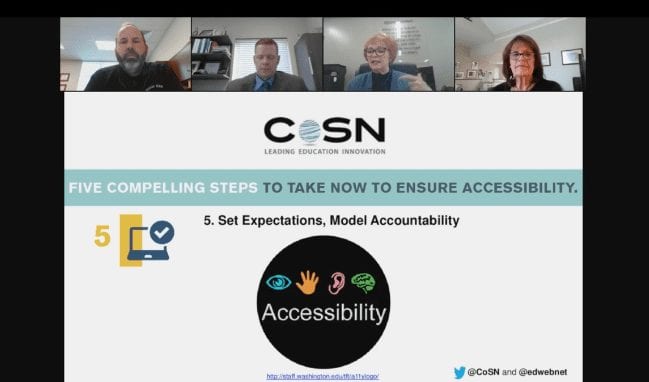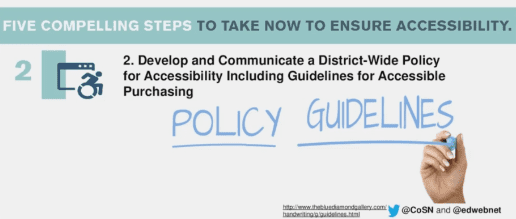Five Steps to Ensure Accessibility for All
While the Individuals with Disabilities Education Act (IDEA) was last reauthorized in 2004, with amendments in 2015, and the Web Content Accessibility Guidelines (WCAG) were updated back in 2008, the demand for accessibility and equality in education continues to grow. Administrators and teachers, who want to help every child reach their potential, can’t afford to wait for new laws and policies. Educators still need to constantly evaluate the effectiveness of accessibility initiatives, advocate for resources for their students, and anticipate where they need to go next. During the edWebinar “Accessibility: Effective, Equitable Learning Environments for All Students,” which is part of a series hosted by CoSN and edWeb.net, the presenters discussed how they approach CoSN’s five steps to ensure accessibility.
Step 1: Stay current with federal and state legislation.
First, every district needs an administrator who stays current on federal and state laws regarding compliance. That person then disseminates information as needed to principals, teachers, etc. In addition, the presenters recommended reaching out to colleagues, staying in touch with state associations, and in general having an ear out for any changes.
Step 2: Develop and communicate a district-wide policy for accessibility including guidelines for accessible purchasing.
The onus is on the district leadership to create accessibility compliance policies for not only the teachers but for the materials they use. Previously, when talking with vendors about accessibility, the conversations didn’t go very far, but now they are able to discuss it in depth. Both sides need to do their due diligence as the goal is to remove barriers to student learning. All policies should be regularly communicated to all constituents and readily available upon request.
Step 3: Build staff capacity.
Accessibility is the responsibility of all educators, staff, and administrators. All staff should receive regular professional development on the district’s guidelines and topics related to accessibility.
Step 4: Conduct regular accessibility audits.
Like professional development, audits shouldn’t be done once a year. Educators need to perform regular evaluations of how the policies, teaching strategies, technology, curriculum, etc., are being implemented and the impact on student achievement. Educators should also talk to the parents and find out their views on accessibility. The goal is to determine where there are gaps and inequities, and the school needs to understand what’s happening outside of the classroom.
Step 5: Set expectations. Model accountability.
Starting with the district office, all staff need to follow the accessibility policies. They need to be a part of the normal, everyday procedures.
Most important, accessibility is not limited to any one group of kids or description. All of the presenters even go beyond what’s required by the law to make sure that every student who needs assistance receives it.
“If you as a superintendent or one of your staff members aren’t willing to step up and take a stand for those kids, then I don’t know who would do it,” said Dr. Tom Muzzey, Superintendent, Orchard Farm R-V School District, MO. “I always think of that and make sure that I have people that are checking me and what I think and believe at all times to make sure what we’re doing is best for our students.”
This edWeb broadcast was co-hosted by CoSN and edWeb.net and sponsored by ClassLink.
This article was modified and published by eSchool News.
About the Presenters
Matthew J. Miller is the superintendent of Lakota Local Schools in Ohio. He has spent the last 24 years serving Ohio communities as a superintendent, director of student services and instruction, principal, and teacher. Matt is actively involved in the prestigious and national League of Innovative Schools through Digital Promise, also serving as an elected member of their advisory committee. He was selected as one of 100 superintendents to attend and present at the #FutureReady National ConnectED Superintendents Summit at the White House, was named to the National School Boards Association Top 20 to Watch, and conducted his first TEDx Talk in 2016 entitled Don’t Buy the Book: Cultivate, Curate and Go Open. Having completed his undergraduate and master’s degree at the University of Cincinnati, he was selected for the Harvard Graduate School of Education’s Leadership Institute for Superintendents. Matt is grateful for his wife, Kristy, and their two children.
Dr. Thomas Muzzey is currently serving as Superintendent of Schools at Orchard Farm R-V School District in St. Charles County, MO. Prior to his service at Orchard Farm, he served as the superintendent for Warren County R-3 schools. Dr. Muzzey has 30 years of experience in public education as a teacher, assistant principal, assistant superintendent and associate superintendent. He earned a bachelor’s degree in elementary education and teaching at Southeast Missouri State University; a master’s degree in education at Webster University; a master’s degree in educational leadership and administration at Southeast Missouri State University; a specialist degree in education administration at University of Missouri St. Louis; and an Ed.D. in education from Maryville University of St. Louis. Most recently, Dr. Muzzey earned his National Superintendent certification from AASA in 2017.
Dr. Donna Wright began serving as Director of Schools for Wilson County Schools, TN in 2014. Under her guidance, district-wide academic performance has significantly improved; the district is undergoing the largest school building program in the history of the county; a concentrated emphasis on early literacy instruction is a focal point; and college and career readiness is a hallmark in middle and high schools. She has worked in public school education, K-12 and higher ed, for over 36 years. Dr. Wright holds a doctorate in leadership studies from the University of Tennessee, has earned several awards, including the Women of Achievement Award and the UT Educators Hall of Honor Award, has authored several articles in educational publications, and continues to serve as an adjunct professor at various institutions of higher learning.
About the Host
Ann McMullan is a 34-year veteran educator who served as the executive director for educational technology in the Klein Independent School District, located just outside Houston, Texas until September 2013, when she and her family moved to Los Angeles, California. For 16 years Ann led the team in Klein ISD that provided professional development on technology and 21st century instructional strategies to over 4,000 professional educators serving over 50,000 students. During that time Ann also co-chaired the Texas Education Technology Advisory Committee which developed the Texas Education Agency’s Long Range Plan for Technology, 2006-2020.
Today, she is based in Los Angeles, California working as a public speaker, writer, and independent education consultant focused on supporting leadership, visioning and planning to meet the needs of today’s students. She is a frequent presenter at state, national and international education conferences. Ann serves as project director for CoSN’s Empowered Superintendents Program. She serves on the board of PowerMyLearning Los Angeles and on the advisory board of Project Tomorrow. In the fall of 2016 Ann co-authored and published Life Lessons in Leadership: The Way of the Wallaby.
Join the Community
Super-Connected is a free professional learning community on edWeb.net for school superintendents, district leadership, and aspiring district leaders.







Comments are closed.